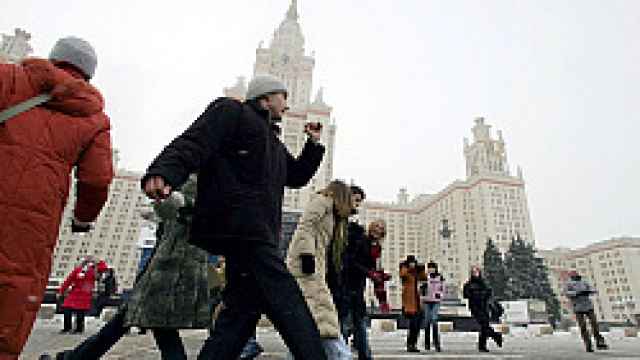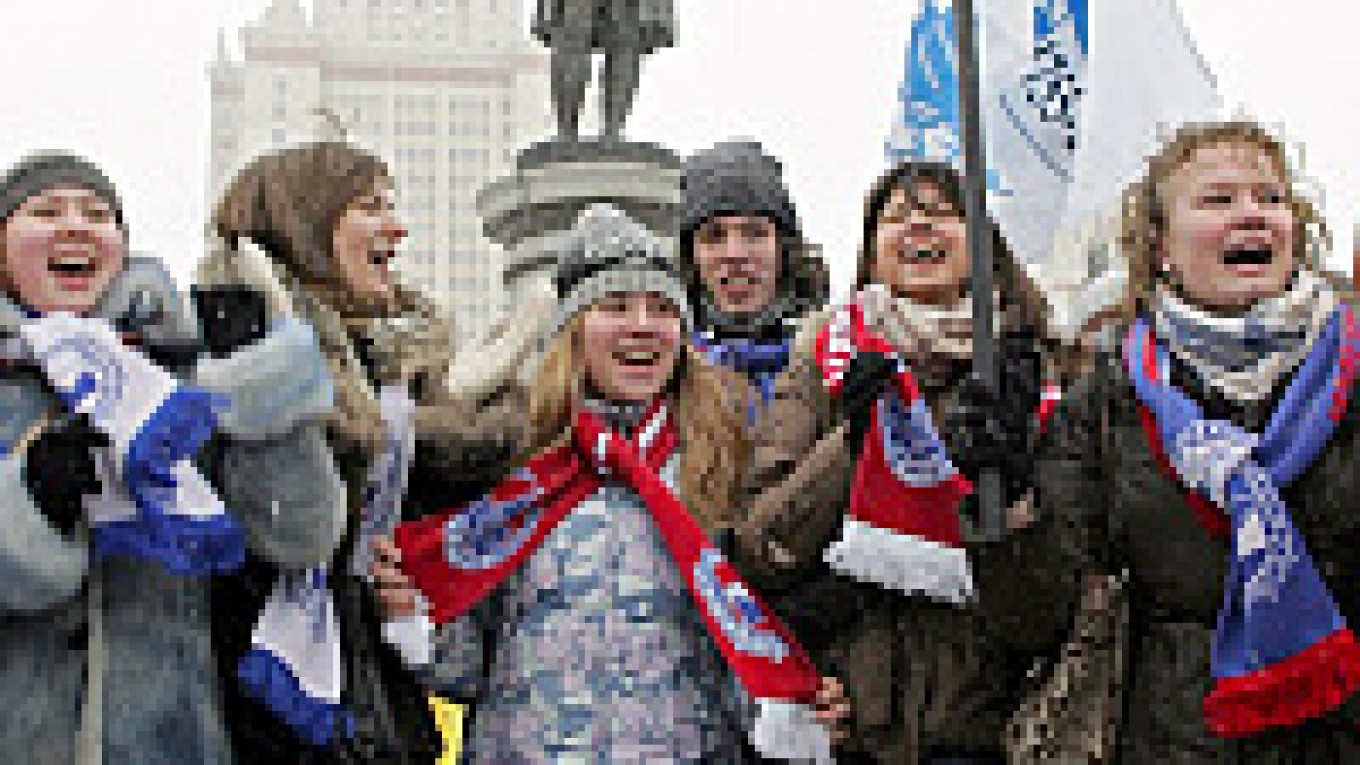When President Boris Yeltsin sent his grandson to the elite Millfield School in Britain in the early 1990s, Russians were appalled that their leader was spending vast amounts of money on tuition while some parents could not afford to buy textbooks. Although most Russians still have not reached the levels of wealth attained by the Yeltsin family, the growing affluence of Russia's middle class has made the prospect of saving for an education abroad less daunting, particularly in continental Europe.
St. Petersburg State Polytechnic University graduate Darya Ivanova has accumulated credits toward her master's degree in nuclear physics at three European universities -- Ghent University in Belgium, Kungliga Tekniska H?gskolan in Stockholm, Sweden, and Universit? Henri Poincar? in Nancy, France. "I went to Ghent University in my first year, spent the fall semester in Nancy and now I'm writing my thesis in Stockholm," Ivanova said. She is studying in Europe under the Erasmus Mundus program, which fosters links between EU universities and non-EU countries.
The German Academic Exchange Service, or DAAD, also provides scholarships for Russian students. According to DAAD, some 10,000 Russians are currently studying in Germany, most of them working on graduate or postgraduate degrees. German universities are also attracting overseas students through international degree programs in which all subjects are taught in English during the first academic year, while students take intensive German classes. "In the second year, most of the subjects are normally taught in German," said Denis Dvizhkov, DAAD's spokesman in Moscow. Ivanova said English was the language of instruction at the three universities she attended, but local languages were taught as well since "the language of the country where you study is a compulsory subject."
But despite all the efforts of Europeans to draw foreign students to their universities, British education is still in a league of its own in terms of attractiveness for Russian students. More than 12,500 Russians are now studying in Britain. "Britain is traditionally considered a paragon of education," said Valentina Ozmidova, director of the education consulting agency Geotek-College. "England has centuries of tradition behind it, and they feel responsible for that. But I wouldn't say that facilities in Germany are worse."
One of the main selling points of European universities is their very low tuition fees, or sometimes the absence of any fees at all. Fees for a semester of study in Germany range from a paltry 150 to 700 euros. Additionally, living in Europe is less expensive than in Britain. A room in a dorm in Germany costs around 300 euros a month while similar accommodation in Britain would be twice as expensive.
Dorms in Russia may be even cheaper, but European education has some obvious advantages. "Students get to travel a lot, and training is better organized, so you have more time to study," said Denis Derkach, a St. Petersburg State University physics major who is doing his Ph.D. at the Universit? Paris-Sud.
Dvizhkov from DAAD noted that Russian universities tend to follow a more didactic approach. "In Russia, it's more like 'go to Room 35 and open your books to page 29,'" he said. "In Germany, students can choose subjects. The Russian system of education doesn't encourage this sort of independence."
Marina Tarasova, a Moscow State University undergraduate student, spent three months at the University of Granada on an exchange program. She also enjoyed the flexibility in the choice of subjects. "There are three types of subjects," she said. "The first kind are required subjects that everyone must study, in the second group you can choose from a list, and in the third you can take anything you like."
Valentina Ozmidova believes that the best thing about European education is the way that things you learn in school translates to real life: "They teach in such a way that you can apply your skills right after graduation and start working," she said.
Ozmidova, who has been the director of Geotek-College for nearly 12 years, believes that the education market in continental Europe remains largely undervalued in Russia. However, recent difficulties in Russian-British relations and new British visa regulations could tip the scales, as a number of prospective Russian students are already abandoning their plans to study in Britain and opting for other European countries instead. "We've recently had a number of people changing their plans of British courses for Switzerland," she said. "They were afraid of possible visa difficulties."
Although Russian students have a lot of pride in the Russian educational system, they admit there are some problems. "To be quite honest, we live in the past century compared with them [Europeans]," said Marina Tarasova, a student in the philology department of Moscow State University. "In the IT classes at my university, we studied Photoshop. In Granada they study special translation software, but here none of us students and few of our teachers have ever heard of it."
St. Petersburg State Polytechnic University graduate Darya Ivanova has accumulated credits toward her master's degree in nuclear physics at three European universities -- Ghent University in Belgium, Kungliga Tekniska H?gskolan in Stockholm, Sweden, and Universit? Henri Poincar? in Nancy, France. "I went to Ghent University in my first year, spent the fall semester in Nancy and now I'm writing my thesis in Stockholm," Ivanova said. She is studying in Europe under the Erasmus Mundus program, which fosters links between EU universities and non-EU countries.
The German Academic Exchange Service, or DAAD, also provides scholarships for Russian students. According to DAAD, some 10,000 Russians are currently studying in Germany, most of them working on graduate or postgraduate degrees. German universities are also attracting overseas students through international degree programs in which all subjects are taught in English during the first academic year, while students take intensive German classes. "In the second year, most of the subjects are normally taught in German," said Denis Dvizhkov, DAAD's spokesman in Moscow. Ivanova said English was the language of instruction at the three universities she attended, but local languages were taught as well since "the language of the country where you study is a compulsory subject."
But despite all the efforts of Europeans to draw foreign students to their universities, British education is still in a league of its own in terms of attractiveness for Russian students. More than 12,500 Russians are now studying in Britain. "Britain is traditionally considered a paragon of education," said Valentina Ozmidova, director of the education consulting agency Geotek-College. "England has centuries of tradition behind it, and they feel responsible for that. But I wouldn't say that facilities in Germany are worse."
 Igor Tabakov / MT Even students from Moscow State University find new challenges studying abroad. | |
Dorms in Russia may be even cheaper, but European education has some obvious advantages. "Students get to travel a lot, and training is better organized, so you have more time to study," said Denis Derkach, a St. Petersburg State University physics major who is doing his Ph.D. at the Universit? Paris-Sud.
Dvizhkov from DAAD noted that Russian universities tend to follow a more didactic approach. "In Russia, it's more like 'go to Room 35 and open your books to page 29,'" he said. "In Germany, students can choose subjects. The Russian system of education doesn't encourage this sort of independence."
Marina Tarasova, a Moscow State University undergraduate student, spent three months at the University of Granada on an exchange program. She also enjoyed the flexibility in the choice of subjects. "There are three types of subjects," she said. "The first kind are required subjects that everyone must study, in the second group you can choose from a list, and in the third you can take anything you like."
Valentina Ozmidova believes that the best thing about European education is the way that things you learn in school translates to real life: "They teach in such a way that you can apply your skills right after graduation and start working," she said.
Ozmidova, who has been the director of Geotek-College for nearly 12 years, believes that the education market in continental Europe remains largely undervalued in Russia. However, recent difficulties in Russian-British relations and new British visa regulations could tip the scales, as a number of prospective Russian students are already abandoning their plans to study in Britain and opting for other European countries instead. "We've recently had a number of people changing their plans of British courses for Switzerland," she said. "They were afraid of possible visa difficulties."
Although Russian students have a lot of pride in the Russian educational system, they admit there are some problems. "To be quite honest, we live in the past century compared with them [Europeans]," said Marina Tarasova, a student in the philology department of Moscow State University. "In the IT classes at my university, we studied Photoshop. In Granada they study special translation software, but here none of us students and few of our teachers have ever heard of it."


